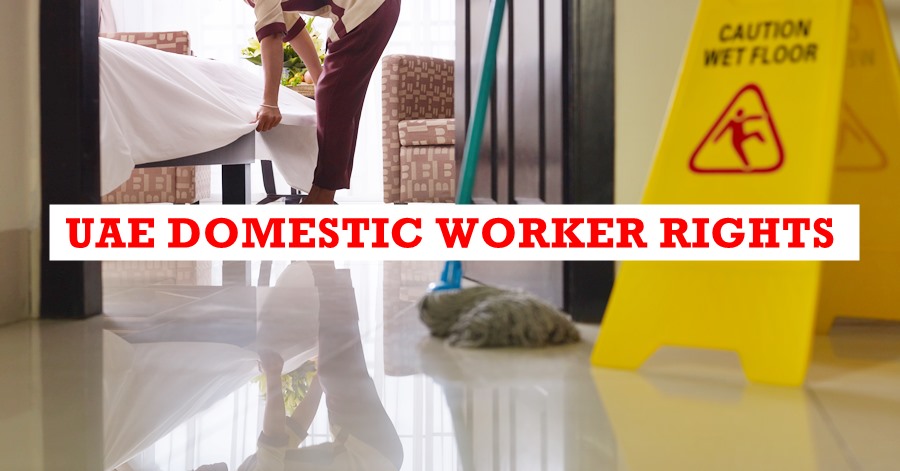To those who have plans of working as a domestic worker in the UAE, it is important that you are aware of your rights as an employee. The country’s labour system has provisions specifically made for overseas workers who seek opportunities in the UAE. This labour code is openly disclosed to the public so that workers would know the things they can rely on in case something happens to them such as disputes on their contracts, salaries, and scope of work.
The United Arab Emirates (UAE) has been known for its two most popular cities—Dubai and Abu Dhabi. Millions of tourists are visiting these cities each year for different reasons such as the amazing skyscrapers in Dubai, the largest infrastructures that you can only see in the city, and many more that get the attention of most people in the world. That’s why it’s one of the places where there’s a large number of foreign nationalities looking for a variety of jobs according to their skills and experiences.
In this article, we will talk about the different rights of domestic workers based on the labor code of the government of the UAE. In case you are a domestic worker in this country, this will help you big time.

Who are domestic helpers in UAE?
Many expats have lived their lives in this country because of the promising careers it can offer no matter what citizenship is. Who wouldn’t want a welcoming place when you are an expat?
The government of the UAE website provided a standard meaning of who the domestic helpers are. The domestic helpers’ law of UAE only applies to expats who have the following occupations:
- housemaid
- private sailor
- watchman and security guard
- household shepherd
- family chauffeur
- parking valet workers
- household horse groomer
- household falcon care-taker and trainer
- domestic laborer
- housekeeper
- private coach
- private teacher
- babysitter/nanny
- household farmer
- gardener
- private nurse
- private PRO
- private agriculture engineer
- cook
What are the rights and privileges of domestic workers in UAE?
Attached to being a domestic worker here in UAE are the rights and privileges anyone can exercise as long as they have one of the occupations mentioned above. Right and privileges are one of the areas covered by the domestic labor law. The other three include contracts, prohibitions, and recruitment agencies which will be discussed later on in this article.
For those who are wondering what are the rights and privileges of working in this country, here’s what you need to know.
The domestic labor law in UAE states that the domestic workers here are entitled to the following rights and privileges:
- Payment of wages – this must be set out in the given contract between the employee and the employer. Based on the law, wages should be given within 10 days from the day they are due.
- 12 hours of rest per day – the inclusion to this is 8 hours of consecutive rest daily.
- 30 days of paid vacation per year – the vacation days should be mutual between the employee and employer.
- 30 days of medical leave per year
- 1 day of paid rest per week – this means that as a domestic worker, you have the right to have 1 day off each week.
- Medical insurance provided by the employer
- A round trip ticket to home every 2 years
- A decent accommodation
- Decent meals paid by the employer
- Work attires for the job paid by the employer
- Possession of their confidential identification documents like passport, IDs, etc.
- A right to dispute to the Ministry of Human Resources and Emiratisation (MoHRE) wherein the ministry will attempt to resolve the issue within two weeks. If the dispute has not been resolved within two weeks, it will be referred to a court.
- A right to be exempted from any court fees when a domestic worker filed cases at all stages of litigation and must be heard in a fast and prompt manner.
His Highness Sheikh bin Zayed Al Nahyan, the President of the UAE, has just approved the Federal Law No. 10 of 2017 with the changes that are stated above already. The law signifies the changes in the provision of domestic workers including but not limited to working hours, leaves, contracts, and settlement of disputes.
This law has a goal to regulate the relationship between employers and employees in the country and as well as the legal protection to both parties.
What are the prohibitions for employees and employers?
Another area of the domestic labor law is the legal prohibitions stating the matters that should not be done by either the employer and the employee. Based on the website of the government of UAE, here are the legal prohibitions you need to watch for:
- Employment of someone who is under 18 years old.
- Discrimination of race, gender, color, political opinion, and religion.
- Physical or verbal sexual harassment
- Forced labor or human trafficking based on the national law and ratified international conventions
- Exposure to physical harm
- Assignment of tasks that are not state or covered in the employee contract.
What are the regulation rules based on domestic law?
Apart from the prohibitions, there are additional rules that you need to note if you are a domestic worker in the UAE. Here’s the following:
- At all times, the domestic worker should be treated in a decent manner, without exposure to any kind of violence at all times.
- Even without telling the employer when resigning, the domestic worker should go to MoHRE to tell them. On the other hand, if the worker leaves without any valid reason, the employer should report to MoHRE.
- The contract can be terminated by the employer or worker if either party fails to meet the obligations set in the contract. Even if the obligations are met, either party may decide to terminate the contract based on the “no-fault” termination included in the Domestic Labor Law.
- The employer is not allowed to make deductions or end-of-service pay from the wages of the workers unless the deductions are debt payable or payment for the repair of any damages caused by the worker. For any deductions, it must not go beyond one-quarter of the salary of the worker.
- The employer may employ the worker under the probationary period of 6 months. The employer has the right to terminate the contract within this period and the recruitment agency should pay for the ticket of the worker back home.
- Tadbeer centres regulated by MoHRE replaced the recruitment agencies for any recruitment and hiring process.
- The job offer must be shown to the employee before she/he leaves her/his home country.
- The labor contract, including the terms and conditions of the employment, must be accredited by the MoHRE.
- Only UAE-registered natural or legal persons with good standing may recruit domestic workers into the UAE.
- An agency should not accept any form of commission or payment in exchange for employment whether prior to or after employment.
How is the hiring process done?
The hiring process of domestic workers in the UAE is done through Tadbeer Centres. The services offered by these centres are regulated by MoHRE, which replaced the recruitment agencies that previously had the capacity to recruit workers. The Tadbeer Centres provide orientation, visa, and training to domestic workers. There are 4 packages to choose from when recruiting domestic helpers through these centres and they are the following:
1. Direct sponsorship – in this package, the centre hires domestic helpers from outside the UAE and gives employers guarantee that the employees are performing and loyal for 180 days. The visa of the employees will be under the direct sponsorship of the employing family under this package.
2. Direct sponsorship after 6 months – in this package, the employing family has the option to temporary hire the worker for 6 months then after that, they may opt to continue the employment based on the agreement of both parties under a direct sponsorship.
3. Tadbeer sponsorship – in this package, the workers will be hired under the Tadbeer sponsorship which provides flexible services based on the requirements of the employing family under a cost unified for all nationalities.
4. Time-based packages – in this package, the employees are hired under the Tadbeer sponsorship wherein families can request for on-demand services.
Some families in the UAE require the assistance of a domestic helper and the demand for it continues to increase. If you are looking for a job in this country you can do the occupation stated earlier, you may want to consider all the things mentioned in this article for your own benefit. Being aware of the labour laws governing the domestic helpers in this country is a big help to avoid any disputes with the employer.
If you are not sure about the rules and regulations, prohibitions, and the hiring process, it is better to consult with someone who can guide you. The website of the government of UAE stating the facts about the domestic law will also help you become knowledgeable in case you are just starting your expat journey. Before you do any step of the process, make sure that you have a background of what you are doing. As an expat, you need to be alert and mindful of the laws.
